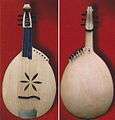Mykola Budnyk
| Mykola Budnyk | |
|---|---|
| Born |
1954 Skolobiv, near Volodarsk-Volynskyi, Zhytomyr region |
| Died |
January 16, 2001 Irpin', Kyiv region |
| Nationality | Ukrainian |
| Occupation | kobzar, luthier, Head of Kobzarskyi Tsekh |
Mykola Petrovych Budnyk Ukrainian: Мико́ла Петро́вич Будник was a luthier and traditional performer in the Kobzar tradition. He was active in authentic construction and recreation of historic folk instruments, and involved in the movement for authentic performаnce practice on Ukrainian folk instruments. Budnyk was also known as a painter and poet. He was born in 1954 in Skolobiv, near Volodarsk-Volynskyi, Zhytomyr region, and died January 16, 2001, in Irpin', Kyiv region.
He was chairman of the Kiev Kobzar Guild (Kobzarskyi Tsekh), bandura,[1][2][3] known as a master player of folk musical instruments, and as an artist and poet.
Creative legacy
Budnyk recreated 17 types of traditional folk instruments - among them different regional types of the kobza, bandura, lira, husli, hudok, torban, husli, hudok and other traditional Ukrainian musical instruments. Together with ethnomusicologist Dr M. J. Khai, Budnyk formally resurrected the Kobzarskyi Tsekh (Kobzar Guild), uniting like-minded intellectuals interested in the study and revival of authentic traditional music of the kobzars.
Budnyk initially studied traditional kobzar performance from Heorhy Tkachenko from 1978, and initially made himself a traditional bandura. He had a natural aptitude to authentic instrument construction and made banduras for many of Tkachenko's students. He later made a number of other authentic Ukrainian folk instruments and also began to teach others how to make and play these instruments in an authentic manner. The Kobzar guild he co-created revived traditional performance practices such as street-performance (busking) (Ukrainian: кобзарювання). Much of the repertoire, such as the para-religious psalms and kants, which were previously suppressed in Soviet times as well as the epic form known as dumy were also reintroduced.
Budnyk authored a textbook on making old-type banduras (Ukrainian: старосвітська бандура).[4]
After his death, his recordings were collected and released in the CDa Mykola Budnyk. Hej, na Chornomu mori... Project "My Ukraine. Bervy". (Hey, at the black sea), by Art-Veles
Teachers
1980 - began to learn to play the bandura and the traditional kobza legacy with Heorhy Tkachenko with a small group of contemporaries: Volodymyr Kushpet, Victor Mishalow, Mykola Tovkaylo and others. He began producing old-type bandura, kobza and lira using traditional technology and methods. After Tkachenko's death he took the leadership position of this movement.
Students
Budnyk had many students of the bandura and hurdy-gurdy, including the well-known film producer Oles Sanin, Oleksandr Kit as well as performers Taras Kompanichenko, Taras Sylenko, Ruslan Kozlenko, Pavlo Zubchenko, and Ivan Kushnir.
 Mykola Budnyk With lira
Mykola Budnyk With lira Veresai Bandura often referred to as a kobza - a Ukrainian Lute-like instrument, described by Mykola Lysenko from Ostap Veresay - Ukrainian blind epic singer approx. in 1871
Veresai Bandura often referred to as a kobza - a Ukrainian Lute-like instrument, described by Mykola Lysenko from Ostap Veresay - Ukrainian blind epic singer approx. in 1871 Kobza made by Ruslan Kozlenko (2005, Kyiv, Ukraine) one of students of M. Budnyk
Kobza made by Ruslan Kozlenko (2005, Kyiv, Ukraine) one of students of M. Budnyk
References
- ↑
- Mishalow, V. - A Short History of the Bandura. East European Meetings in Ethnomusicology 1999, Romanian Society for Ethnomusicology, Volume 6, - С.69-86
- ↑ Diakowsky, M. - A Note on the History of the Bandura. The Annals of the Ukrainian Academy of Arts and Sciences in the U.S. - 4, 3-4 №1419, N.Y. 1958 - С.21-22
- ↑ Mizynec, V. - Folk Instruments of Ukraine. Bayda Books, Melbourne, Australia, 1987 - 48с.
- ↑ Mishalov, Mykola V. Budnyk - posthumous mention / / Bandura, 2001, Part 75
Further reading
- Diakowsky, M. - A Note on the History of the Bandura. The Annals of the Ukrainian Academy of Arts and Sciences in the U.S. - 4, 3-4 №1419, N.Y. 1958 - С.21-22
- Mishalow, V. and M. - Ukrains'ki kobzari-bandurysty - Sydney, Australia, 1986
- Haydamaka, L. – Kobza-bandura – National Ukrainian Musical Instrument. "Guitar Review" №33, Summer 1970 (С.13-18)
- Mishalow, V. - A Brief Description of the Zinkiv Method of Bandura Playing. Bandura, 1982, №2/6, - С.23-26
- Mishalow, V. - A Short History of the Bandura. East European Meetings in Ethnomusicology 1999, Romanian Society for Ethnomusicology, Volume 6, - С.69-86
- Mizynec, V. - Folk Instruments of Ukraine. Bayda Books, Melbourne, Australia, 1987 - 48с.
- Cherkasky, L. - Ukrainski narodni muzychni instrumenty. Tekhnika, Kiev, Ukraine, 2003 - 262 pages. ISBN 966-575-111-5